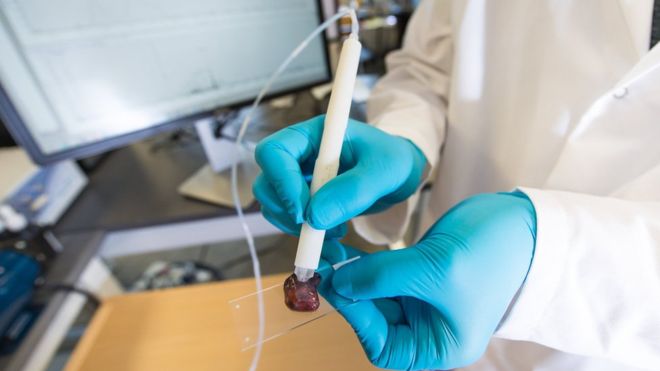A handheld device very much similar to a pen can accurately identify cancerous tissue in as little as 10 seconds, according to scientists. This could make it easier for surgeons to remove a tumor safely, precisely and quickly, and would prevent any cancer cells from lingering in the body.
Researchers at the University of Texas have developed the MasSpec Pen, which is reportedly accurate 96% of the time, the BBC reports. The device uses the unique metabolism of cancer cells, which grow and spread rapidly. This ability makes them different from healthy tissue.
The MasSpec Pen is touched on to a suspected cancer where it releases a water droplet. Chemicals inside the cells move into the droplet, which the pen then sucks back up for analysis. A mass spectrometer reads the pen’s contents, analysing the mass of the water’s chemical composition. The spectrometer then produces a chemical “fingerprint” that doctors can use to identify between healthy and cancerous cells.
The challenge becomes how doctors find the line between healthy and cancerous tissue, as it some tumors, the boundary can be unclear. But the pen should help doctors make sure that no cancer is left. Removing too little tissue will cause regrowth of the cancer, while removing too much might severely damage an organ.
Livia Eberlin, an assistant professor of chemistry at the University of Texas, said,
What’s exciting about this technology is how clearly it meets a clinical need. The tool is elegant and simple and can be in the hands of surgeons in a short time.
The pen has been tested on 253 samples, and the researchers intend to keep testing in order to refine any problems, before using it on trails next year. The MasSpec Pen currently reads a patch of tissue that is 0.06 inches across, but the researchers are working on looking at a patch as fine as just 0.6mm in width.
Eberlin said, “The roadblock is the mass spectrometer, for sure. We’re visioning a mass spectrometer that’s a little smaller, cheaper and tailored for this application that can be wheeled in and out of rooms.”
This is the latest technology that attempts to improve on the accuracy of surgical procedures.
The study was published in Science Translational Medicine.
























